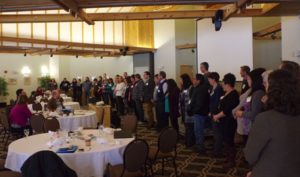Forum focused on health equity hosts Indigenous health leaders and system providers

By Rick Garrick
FORT WILLIAM—The need for more Indigenous health staff in the Thunder Bay area was raised during the North West Local Health Integration Network Aboriginal Health Forum, held Feb. 16 at Fort William Historical Park.
“I’ve been a Canadian all my life, but now I’m discovering Indigenous culture [and] communities and unfortunately I’m at the end of my career,” says Jean Bartkowiak, president and CEO of the Thunder Bay Regional Health Sciences Centre (TBRHSC). “There is only so much I will be able to do with that knowledge, but I hope that through different strategies I will be able to groom succession inside the Indigenous community to take over, if not my job, that of my senior leaders or that of senior leaders elsewhere in the region.”
Bartkowiak says he does not know of any Indigenous senior managers within the hospitals in the Thunder Bay region.
“There is not to my knowledge any CEO or senior leader within the hospitals in the region that are Indigenous, yet 20-25 per cent of the population we serve are Indigenous,” Bartkowiak says. “On my staff, I have two senior leaders from Finnish descent, zero from Indigenous descent. And yet there are only 10 per cent Finns in Thunder Bay, less than that if you look at all of northwestern Ontario. A full 25 per cent of my senior leadership team is from the Finn community.”
Cynthia Wesley-Esquimaux, Lakehead University’s Chair on Truth and Reconciliation and a Chippewas of Georgina Island citizen, says the leadership team will change as more Indigenous people pursue their education goals.
“It will be there — the education rates are going up pretty substantially,” Wesley-Esquimaux says. “But it’s also what is important to First Nations people. Not everybody wants to be a manager or wants to take on those responsibilities. People are going back to help their communities; they’ve got to do that first.”
Wesley-Esquimaux delivered a presentation at the forum on the need to acknowledge the history of the country, noting that “some pretty serious damage” was done to Indigenous people over the past 600 years.
“We need to help with the understanding that there’s healing that has to happen at the genesis of the problem,” Wesley-Esquimaux says. “There is an intergenerational effect here; whether it’s about sexual violence or domestic violence or some of the issues. We have to address those, and the way to do that is for people in the entire country to get behind the changes that are necessary and support the fact that Indigenous peoples are a very small portion of the country and that the 33 million other people need to push to ensure those resources are allocated to the right places.”
When Michael White, trainer with the Ontario Federation of Indigenous Friendship Centres and a M’Chigeeng citizen, asked all of the treaty people in the room to step forward during his presentation, he emphasized that everybody in Canada is receiving benefits from treaties, not just First Nations people.
“If you are new to Canada and you have signed paperwork and taken an oath of citizenship or a permanent resident, you are living within the political structures of an institution that has created treaty with Indigenous people,” White says. “So there is nobody here that isn’t a treaty person.”
The forum was held for Indigenous health leaders and health system providers to generate discussion and exchange knowledge with a focus on how to improve health equity in northwestern Ontario.


